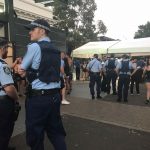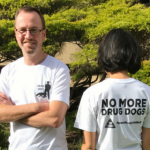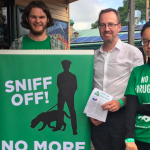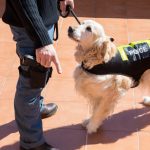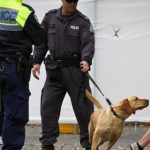NSW Police Continue Unfair Exclusion Policy at Music Festivals
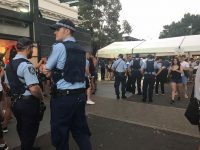
There was a public outcry mid-year after NSW police began employing a new strategy, whereby punters were denied entry to music festivals following a positive indication by a drug detection dog even though no illicit substances were subsequently found.
And despite the fact that there’s been little noise about the use of this quite-possibly-illegal tactic over the last couple of months, the NSW Police Force (NSWPF) is definitely keeping the option of using it open.
The recently released NSW government music festival safety panel report asserts that amongst the “diverse” policing strategies employed at events, NSW police officers “can deny someone entry if a drug detection dog makes a positive indication” and they have “the authority of the licensee.”
There’s no mention of the need for any illegal drugs to be found to result in a barring. Indeed, this is in keeping with a NSWPF warning to patrons of the Above and Beyond festival in June that they’d be denied entry following a dog indication “regardless of whether drugs” were located.
A false positive exclusion policy
“What’s apparent from the panel report is the police are actually working together with compliant festivals to reject people on the basis of false positives,” NSW Greens MLC David Shoebridge said. “They seem to be sticking to that policy.”
This policy of blocking entry following false positives – when a sniffer dog makes an indication, but no drugs are found – is quite broad in its reach. Mr Shoebridge has pointed out in the past that according to official statistics, drug dogs get it wrong two-thirds to three-quarters of the time.
The police started this policy of denying entry to punters with no drugs on them at the Midnight Mafia event in May. And then in June, at least five people were barred from attending Above and Beyond following false positive indications.
Skirting around the question
At a Budget Estimates hearing in August, Mr Shoebridge asked NSW police minister Troy Grant which NSWPF member signed off on the policy of cancelling the tickets of festivalgoers or preventing them from entering venues following a false positive indication.
In answers to questions on notice published in September, the police minister stated that NSW police have no policy of cancelling tickets, as only promoters or venue licensees can do so. But, Mr Grant failed to address the part of the question involving denying entry following false positives.
“Whilst we’ve still have anecdotal reports of people being refused following a false positive,” Mr Shoebridge told Sydney Criminal Lawyers®, “there hasn’t been anything like the systematic refusals of entries that we saw at Above and Beyond and Midnight Mafia.”
An overreach of police powers
NSW police implied in its Facebook search policy warning prior to Above and Beyond that sniffer dogs often make false positive indications because those people who are indicated have previously been handling drugs.
Mr Shoebridge said that this suggestion is an “appalling case of police overreach”. And he questioned what the purpose of the search following a positive indication from a sniffer dog is if an individual is to be found guilty of drug possession regardless of whether they have any or not.
“We live in a bizarre world where NSW police are judging people guilty on the opinion of a dog. That isn’t the law,” the NSW Greens justice spokesperson continued. “And we believe the police are legally vulnerable if they continue on that path.”
The Sniff Off challenge
While the Law Enforcement (Powers and Responsibility) Act 2002 provides NSW police with powers to search people without a warrant when they have a reasonable suspicion to do so, the legislation in no way provides them with the discretion to punish innocent people following such a search.
On the day prior to the Above and Beyond festival, anti-drug dog campaign Sniff Off launched a legal challenge against this policy of punishing those who aren’t guilty of an offence. However, the court dismissed the case stating that no one’s rights had yet been violated.
A joint venture between Mr Shoebridge and the NSW Young Greens, Sniff Off has been campaigning for the end of the warrantless use of sniffer dogs in public places by NSW police since 2011.
And Shoebridge made clear that despite the initial setback, Sniff Off is still mounting the legal challenge against the use of this practice by NSW police. “The lawyers that have taken it on are still looking for the best option to seek legal redress,” he added.
Saturation policing doesn’t work
The music safety report that stated police have the ability to bar entry to festivalgoers following a false positive sniffer dog indication was commissioned by NSW premier Gladys Berejiklian following the drug-related deaths of two young people at the Defqon.1 festival in September.
There was saturation policing at that event. Figures obtained by Mr Shoebridge indicate that there were 194 officers at that event in addition to the close to $90,000 worth of policing that promoters had already paid for.
And of the 335 searches carried out by police following an indication by a drug dog, only 70 turned up illicit substances, and just 9 of those cases were drug supply. This means that around 80 percent of the time punters were searched it was following a false positive indication.
But, tragically, this aggressive show of force did nothing to save the lives of two Australians in their early 20s.
A government in deadly denial
The majority of the community is now calling for the roll out of pill testing at music festivals, which is a harm reduction approach to illicit drug use that’s been saving lives in European countries where it’s been in use for decades.
Yet, Ms Berejiklian told her safety panel – which was bizarrely comprised of the NSW police commissioner, the head of liquor licensing and the chief health officer – not to consider this life-saving approach. And following its findings, she went onto announce further tough drugs penalties.
“This shows we have government with no idea how to address the problem that’s committed to adding more resources to an already police first policy,” Mr Shoebridge said.
“They tried the extreme policing model at Defqon and it was a comprehensive failure,” he concluded, “yet they’re so unwilling to consider rational alternatives that that’s their only solution.”


